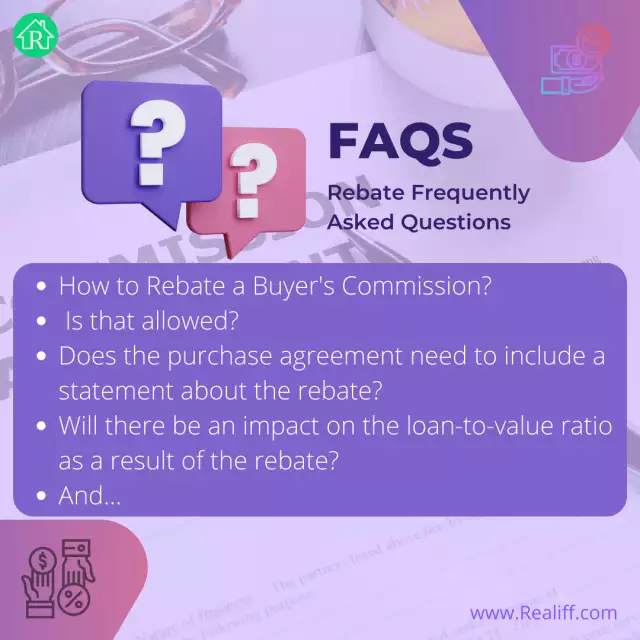Real Estate Rebates or Cashback: Which is Tax-Friendly?
Real Estate Rebates or Cashback: Which is Tax-Friendly?
When it comes to real estate transactions, there are many ways to save money. One popular option is to take advantage of either a rebate or cashback offer. Both options can provide significant savings, but it's important to understand the differences between the two, as well as the tax implications. In this article, we will dive into the topic of real estate rebates and cashback and help you determine which is the most tax-friendly option for you.
Rebate
A rebate is a reduction in the purchase price of a property. This reduction is typically offered by the builder or developer of the property and is often used as a marketing tool to entice buyers. Rebates are typically offered as a percentage of the purchase price, for example, a 2% rebate on a $300,000 home would result in a $6,000 reduction in the purchase price. Rebates are typically paid out at closing, which means that the buyer will see the savings immediately.
Cashback
Cashback, on the other hand, is a reimbursement of a portion of the closing costs. This reimbursement is typically offered by the builder or developer and is also used as a marketing tool to entice buyers. Cashback is typically offered as a percentage of the closing costs, for example, a 2% cash back on $10,000 in closing costs would result in a $200 reimbursement. Cashback is typically paid out after closing, which means that the buyer will see the savings a little later.
Tax Implications
When it comes to the tax implications of rebates and cashback, there are some key differences to consider. Rebates are considered part of the purchase price of the property and are therefore included in the basis of the property. This means that when you sell the property in the future, the rebate will be included in the calculation of your capital gains. This can have a significant impact on your taxes, as capital gains taxes are typically higher than other taxes.
Cashback, on the other hand, is considered a reimbursement of closing costs and is not included in the basis of the property. This means that when you sell the property in the future, the cashback will not be included in the calculation of your capital gains. This can result in significant tax savings, as you will not have to pay taxes on the cashback when you sell the property.
Note:
It's important to note that the tax implications of rebates and cashback can vary depending on the specific circumstances of the transaction. For example, if the rebate or cashback is offered as part of a special promotion or incentive, it may be considered income and subject to taxes. It's always best to consult with a tax professional to determine the specific tax implications of a rebate or cashback in your situation.
Related Questions and Answers
What is a rebate in real estate?
A rebate in real estate is a reduction in the purchase price of a property. It is typically offered by the builder or developer of the property and is often used as a marketing tool to entice buyers. Rebates are typically offered as a percentage of the purchase price.
What is cashback in real estate?
Cashback in real estate is a reimbursement of a portion of the closing costs. It is typically offered by the builder or developer and is also used as a marketing tool to entice buyers. Cashback is typically offered as a percentage of the closing costs.
How do rebates and cashback differ in terms of tax implications?
Rebates are considered part of the purchase price of the property and are included in the basis of the property. This means that when you sell the property in the future, the rebate will be included in the calculation of your capital gains. On the other hand, cashback is considered a reimbursement of closing costs and is not included in the basis of the property. This means that when you sell the property in the future, the cashback will not be included in the calculation of your capital gains.
Can the tax implications of rebates and cashback vary depending on the specific circumstances of the transaction?
Yes, the tax implications of rebates and cashback can vary depending on the specific circumstances of the transaction. For example, if the rebate or cashback is offered as part of a special promotion or incentive, it may be considered income and subject to taxes. It's always best to consult with a tax professional to determine the specific tax implications of a rebate or cashback in your situation.
Is it better to choose a rebate or cashback when it comes to taxes?
It depends on your specific situation. Cashback is considered a reimbursement of closing costs and is not included in the basis of the property, which can result in significant tax savings. Rebates are considered part of the purchase price of the property and are included in the basis of the property, which can result in higher taxes when you sell the property. Ultimately, it's best to consult with a tax professional to determine the most tax-friendly option for your specific situation.
Conclusion
In conclusion, when it comes to real estate rebates and cashback, both options can provide significant savings. However, it's important to understand the differences between the two, as well as the tax implications. Rebates are considered part of the purchase price of the property and are included in the basis of the property, which can result in higher taxes when you sell the property. Cashback is considered a reimbursement of closing costs and is not included in the basis of the property, which can result in significant tax savings. Ultimately, it's best to consult with a tax professional to determine the most tax-friendly option for your specific situation.










